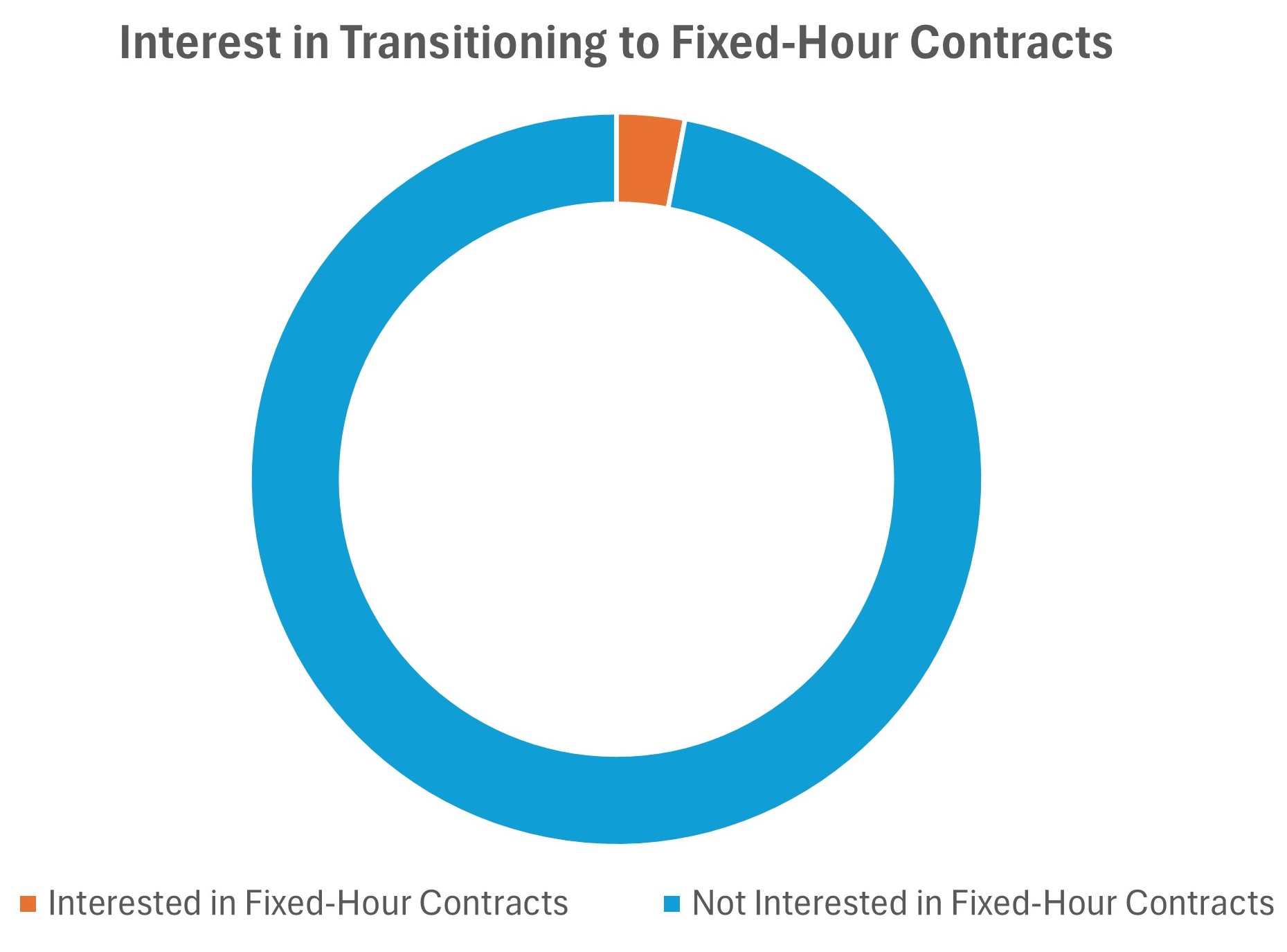



Key Insights From Industry Feedback
Through the Employment Rights Bill, the government aims to fulfil its pledge to end exploitative zero-hour contracts. For industries like promotional marketing, which must build unpredictable and time-sensitive campaigns, zero-hour contracts have long been crucial in enabling agencies to meet fluctuating client demands that vary in scale, timing, and location. At the same time, these contracts offer a lifeline of adaptable employment to many workers—students, freelancers, and part-timers who value the freedom to work across multiple projects and agencies on their own terms. In response to these changes, the IPM conducted detailed surveys and one-on-one interviews with a wide range of stakeholders. This approach enabled us to collect valuable insights from both employers and employees, ensuring a balanced and robust analysis. Below, we discuss the primary findings that highlight the operational necessity, worker preferences, and concerns regarding proposed legislative changes.
Key Insights From Industry Feedback
Through the Employment Rights Bill, the government aims to fulfil its pledge to end exploitative zero-hour contracts. For industries like promotional marketing, which must build unpredictable and time-sensitive campaigns, zero-hour contracts have long been crucial in enabling agencies to meet fluctuating client demands that vary in scale, timing, and location. At the same time, these contracts offer a lifeline of adaptable employment to many workers—students, freelancers, and part-timers who value the freedom to work across multiple projects and agencies on their own terms. In response to these changes, the IPM conducted detailed surveys and one-on-one interviews with a wide range of stakeholders. This approach enabled us to collect valuable insights from both employers and employees, ensuring a balanced and robust analysis. Below, we discuss the primary findings that highlight the operational necessity, worker preferences, and concerns regarding proposed legislative changes.
Operational Necessity
The promotional marketing sector relies on zero hour contracts to scale their workforce up or down in response to campaign-specific needs, seasonal peaks, and unpredictable workloads. Consequently, both agencies and workers benefit—agencies maintain operational efficiency, while workers enjoy the autonomy to choose assignments that fit their schedules. Respondents emphasised that guaranteed hours or rigid scheduling requirements would disrupt this model, imposing unsustainable financial and administrative burdens.

Worker Preference
Many workers value zero-hour contracts for their autonomy, using them to supplement income or balance other commitments like studies, childcare, or creative pursuits. In a survey of over 370 staff conducted by one of the respondents, only 3% of surveyed workers expressed interest in transitioning to fixed hour contracts. This sentiment echoes across the industry, where workers appreciate the ability to balance other commitments like education, childcare, or creative pursuits while engaging in promotional work.

Concerns Over Proposed Legislative Changes
The IPM’s response raises concerns about the potential impact of proposed legislative changes on zero-hour contracts, particularly regarding guaranteed hours and transfer fees.
Economic Impact
Zero-hour contracts allow businesses to remain competitive in global markets by offering the flexibility clients demand. Restrictive legislation risks driving clients to alternative marketing methods or international competitors, threatening jobs and stalling the industry’s post-pandemic recovery. Experiential marketing, a sector heavily reliant on zero-hour contracts, has seen remarkable growth, with a record-breaking 23.1% increase in Q1 2024—the highest in the eleven-year history of Bellwether data. This growth highlights the vital role of flexible staffing in meeting client demands and sustaining industry expansion.
Guaranteed Hours
The promotional marketing sector relies heavily on zero hour contracts to scale their workforce up or down in response to campaign-specific needs, seasonal peaks, and unpredictable workloads. Consequently, both agencies and workers benefit—agencies maintain operational efficiency, while workers enjoy the autonomy to choose assignments that fit their schedules. Respondents emphasised that guaranteed hours or rigid scheduling requirements would disrupt this model, imposing unsustainable financial and administrative burdens.
Transfer Fees & Extended Hire
The introduction of transfer fees or extended hire periods could impose additional financial and administrative burdens on agencies. “Any additional fees would cut into our margins, which are tight as it is,” commented an agency representative. There is a concern that such measures could deter clients from engaging with agencies, shifting budgets toward less flexible marketing methods and undermining the industry’s competitive edge.
Recommendations
The flexibility offered by zero-hour contracts benefits both employers and employees. For businesses, it ensures responsiveness to unpredictable workloads. For workers, it provides the freedom to choose assignments aligned with their schedules. The IPM advocates for evidence-based reforms that protect workers without undermining the flexibility integral to the industry’s success. These include:
- Enhanced Cancellation Policies: Introducing clear, predictable policies to address last-minute cancellations without mandating fixed hours.
- Voluntary Predictable Hours: Allowing workers to request predictable hours after a reasonable reference period, balancing worker needs with business realities.
- Strengthened Agreements: Supporting tailored contracts that safeguard both businesses and workers while preserving adaptability.
Next Steps
The IPM remains committed to engaging with the government to ensure that any changes to zero-hour contract regulations are informed by the realities of the industry. The organisation seeks to work collaboratively with policymakers to develop solutions that protect workers without compromising the flexibility that is vital to both businesses and employees. By maintaining flexibility and protecting worker rights, the UK can ensure that promotional marketing continues to be a vibrant and competitive sector.
For further information or to discuss the IPM’s response in more detail, please contact:
Emma Kirk
General Manager, Institute of Promotional Marketing
Email: emmak@theipm.org.uk
Pringles × Super Mario: The Boss Level Brand Partnership That Won the IPM Grand Prix
Brand Culture, last year’s IPM Grand Prix winners, reveal how Pringles × Super Mario turned a brand partnership into shelf-side excitement, from the Mystery Flavour “question block” idea to collectable character cans.
HFSS Advertising Regulations: What Marketers Need to Know
HFSS regulations have entered a new phase. This article breaks down what the latest rules mean for marketers, where the key risks sit, and how IPM tools and legal support can help.
Promotions Wrapped! Playing Back the Biggest Trends of 2025
From Superman on The Shard to ‘AI slop’, see what cut through in 2025...
Operational Necessity
The promotional marketing sector relies on zero hour contracts to scale their workforce up or down in response to campaign-specific needs, seasonal peaks, and unpredictable workloads. Consequently, both agencies and workers benefit—agencies maintain operational efficiency, while workers enjoy the autonomy to choose assignments that fit their schedules. Respondents emphasised that guaranteed hours or rigid scheduling requirements would disrupt this model, imposing unsustainable financial and administrative burdens.

Worker Preference
Many workers value zero-hour contracts for their autonomy, using them to supplement income or balance other commitments like studies, childcare, or creative pursuits. In a survey of over 370 staff conducted by one of the respondents, only 3% of surveyed workers expressed interest in transitioning to fixed hour contracts. This sentiment echoes across the industry, where workers appreciate the ability to balance other commitments like education, childcare, or creative pursuits while engaging in promotional work.
Concerns Over Proposed Legislative Changes
The IPM’s response raises concerns about the potential impact of proposed legislative changes on zero-hour contracts, particularly regarding guaranteed hours and transfer fees.
Economic Impact
Zero-hour contracts allow businesses to remain competitive in global markets by offering the flexibility clients demand. Restrictive legislation risks driving clients to alternative marketing methods or international competitors, threatening jobs and stalling the industry’s post-pandemic recovery. Experiential marketing, a sector heavily reliant on zero-hour contracts, has seen remarkable growth, with a record-breaking 23.1% increase in Q1 2024—the highest in the eleven-year history of Bellwether data. This growth highlights the vital role of flexible staffing in meeting client demands and sustaining industry expansion.
Guaranteed Hours
The promotional marketing sector relies heavily on zero hour contracts to scale their workforce up or down in response to campaign-specific needs, seasonal peaks, and unpredictable workloads. Consequently, both agencies and workers benefit—agencies maintain operational efficiency, while workers enjoy the autonomy to choose assignments that fit their schedules. Respondents emphasised that guaranteed hours or rigid scheduling requirements would disrupt this model, imposing unsustainable financial and administrative burdens.
Transfer Fees & Extended Hire
The introduction of transfer fees or extended hire periods could impose additional financial and administrative burdens on agencies. “Any additional fees would cut into our margins, which are tight as it is,” commented an agency representative. There is a concern that such measures could deter clients from engaging with agencies, shifting budgets toward less flexible marketing methods and undermining the industry’s competitive edge.
Recommendations
The flexibility offered by zero-hour contracts benefits both employers and employees. For businesses, it ensures responsiveness to unpredictable workloads. For workers, it provides the freedom to choose assignments aligned with their schedules. The IPM advocates for evidence-based reforms that protect workers without undermining the flexibility integral to the industry’s success. These include:
- Enhanced Cancellation Policies – Introducing clear, predictable policies to address last-minute cancellations without mandating fixed hours.
- Voluntary Predictable Hours – Allowing workers to request predictable hours after a reasonable reference period, balancing worker needs with business realities.
- Strengthened Agreements – Supporting tailored contracts that safeguard both businesses and workers while preserving adaptability.
Next Steps
The IPM remains committed to engaging with the government to ensure that any changes to zero-hour contract regulations are informed by the realities of the industry. The organisation seeks to work collaboratively with policymakers to develop solutions that protect workers without compromising the flexibility that is vital to both businesses and employees. By maintaining flexibility and protecting worker rights, the UK can ensure that promotional marketing continues to be a vibrant and competitive sector.
For further information or to discuss the IPM’s response in more detail, please contact:
Emma Kirk
General Manager, Institute of Promotional Marketing
Email: emmak@theipm.org.uk
News
Pringles × Super Mario: The Boss Level Brand Partnership That Won the IPM Grand Prix
Brand Culture, last year’s IPM Grand Prix winners, reveal how Pringles × Super Mario turned a brand partnership into shelf-side excitement, from the Mystery Flavour “question block” idea to collectable character cans.
HFSS Advertising Regulations: What Marketers Need to Know
HFSS regulations have entered a new phase. This article breaks down what the latest rules mean for marketers, where the key risks sit, and how IPM tools and legal support can help.
Promotions Wrapped! Playing Back the Biggest Trends of 2025
From Superman on The Shard to ‘AI slop’, see what cut through in 2025...





